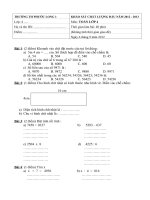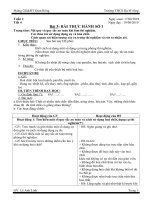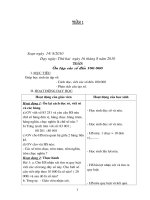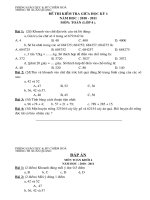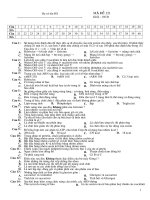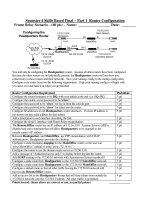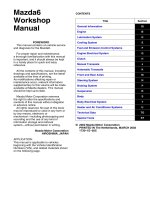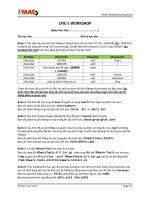4 APAPARI workshop foodallergy en (1)
Bạn đang xem bản rút gọn của tài liệu. Xem và tải ngay bản đầy đủ của tài liệu tại đây (5.54 MB, 57 trang )
2017 APAPARI Workshop in Hanoi
What’s New in Food Allergy?
Takao Fujisawa, MD. PhD.
Allergy Center and
Institute for Clinical Research
Mie National Hospital
JAPAN
Food allergy is increasing
in the world
A survey in 2012 by World Allergy Organization (W
AO) showed that the vast majority of countries rep
orted an increase in food allergy prevalence
in food
the
OFC proven
allergy
preceding 10 years.
in preschool children
10% in Europe, 7% in
China
Prescott SL. A global survey of changing patterns of food allergy burden in children. World Allergy
Food allergy is on the rise
•
Prevalence of self-reported peanut or tree nut allergy
increased more than 3-fold from 1997 to 2008 ( USA)
•
•
Sicherer SH. Us prevalence of self-reported peanut, tree nut, and sesame allergy: 11-year
follow-up. J Allergy Clin Immunol 2010;125:1322-1326.
Retrospective analysis of referred children to allergy
specialists; 4-fold increase from 1995 to 2005 ( Australia)
•
Mullins RJ. Paediatric food allergy trends in a community-based specialist allergy practice,
1995-2006. The Medical journal of Australia 2007;186:618-621.
Food allergy is on the rise
School survey in Japan
(Ministry of Education and Science, Japan)
2007
Food allergy
Anaphylaxis
Elementary (7-12y)
Junior high (1315y)
High (16-18 y)
Total
2013
Food allergy
Anaphylaxis
Epipen® holders
Elementary (7-12y)
Junior high (1315y)
High (16-18 y)
Total
/>
A paradigm shift
What’s New in Food Allergy?
Prevention of food allergy
To prevent food allergy…..
Maternal avoidance of allergenic food..
To prevent food allergy…..
Maternal avoidance of allergenic food did not prevent de
velopment of allergic diseases and food sensitization.
Egg sensitization (18month )
Milk sensitization (18month )
Kramer MS, Kakuma R. Maternal dietary antigen avoidance during pregnancy or lactation, or both, for preventing or treating
To prevent food allergy…..
Maternal avoidance of allergenic food did not prevent de
velopment of allergic diseases and food sensitization.
estational weight gain
Birthweight
Kramer MS, Kakuma R. Maternal dietary antigen avoidance during pregnancy or lactation, or both, for preventing or treating
To prevent food allergy…..
The EP does not recommend restricting
maternal diet during pregnancy or
lactation as a strategy for preventing the
development or clinical course of FA.
Boyce. Guidelines for the Diagnosis and Management of Food Allergy in the United States: Summary of the NIAID-Sponsored
Expert Panel Report. J Allergy Clin Immunol 2010; 126:1105-18.
To prevent food allergy…..
Old recommendation
• Solid foods should not be introduced into the diet of highrisk infants until 6 months of age,
with dairy products delayed until 1 year, eggs until 2
years, and peanuts, nuts, and fish until 3 years of age.
• American Academy of Pediatrics. Committee on Nutrition.
Hypoallergenic infant formulas. Pediatrics 2000; 106:346-9.
Resulting in
To prevent food allergy…..
Old recommendation
• Solid foods should not be introduced into the diet of
high-risk infants until 6 months of age,
with dairy products delayed until 1 year, eggs until 2
years, and peanuts, nuts, and fish until 3 years of age.
• American Academy of Pediatrics. Committee on Nutrition.
Hypoallergenic infant formulas. Pediatrics 2000; 106:346-9.
Koplin JJ. Can early introduction of egg preven
egg allergy in infants? A population-based
study.
J Allergy Clin Immunol 2010; 126:807-13.
More egg allergy !!
To prevent food allergy…..
New paradigm: early consumption of peanut
LEAP study
LEAP-ON study
To prevent food allergy…..
New paradigm: early consumption of peanut
Peanut allergy at 60 months
LEAP study
Peanut allergy at 72 months
LEAP-ON study
To prevent food allergy…..
New paradigm: early consumption of allergenic food
General population
6 allergenic food
from 3 months of age
Adherence=42.8%
To prevent food allergy…..
New paradigm: early consumption of heated egg
prevented egg allergy
PETIT study
Natsume O, Two-step egg introduction for prevention of egg allergy in high-risk infants with
eczema (PETIT): a randomised, double-blind, placebo-controlled trial. Lancet 2017; 389: 276-
To prevent food allergy…..
Allergenic food to babies ????
To prevent food allergy…..
llergenic food to babies…
Maternal avoidance is not good.
Early consumption is better than delayed introductio
To prevent food allergy…..
llergenic food to babies…
Maternal avoidance is not good.
Early consumption is better than delayed introductio
“Early egg or peanut introduction to the infant diet was
associated with lower risk of developing egg or peanut
allergy.
“
Ierodiakonou
D, Timing of Allergenic Food Introduction
to the Infant Diet and Risk of Allergic or Autoimmune
Disease: A Systematic Review and Meta-analysis.
JAMA 2016; 316: 1181-1192.
To prevent food allergy…..
llergenic food to babies…
Maternal avoidance is not good.
Early consumption is better than delayed introductio
We do not know, however,
Who is the right target for novel intervention?
When to start?
What food?
How to eat?
Where is the goal?
What’s New in Food Allergy?
Diagnosis
Immunopathologybased classification
Muraro A, Werfel T, Hoffmann-Sommergruber K, et al. EAACI Food Allergy and Anaphylaxis Guidelines: diagnosis and management
of food allergy. Allergy. 2014; 69: 1008-25.
Clinical type of food allergy
Clinical phenotypebased classification
Ebisawa M, Ito K, Fujisawa T, Japanese guidelines for food allergy 2017. Allergol Int
2017; 66: 248-264.
Clinical types of food allergy
Neonatal Infantile gastrointestinal allergy
(Food-induced enterocolitis syndrome :FPIES)
Cell mediated/ IgE mediated
Infantile atopic dermatitis
associated with
food allergy
Immediate type food allergy
IgE mediated
IgE mediated
Food-dependent
exercise-induced anaphylaxis
IgE mediated
Oral allergy syndrome
Pollen-food allergy syndrome
IgE mediated
Ebisawa M, Ito K, Fujisawa T, Japanese guidelines for food allergy 2017. Allergol Int
2017; 66: 248-264.
Infantile atopic dermatitis is stron
gly associated with food sensitizat
ion
619 breast-fed infants at 3month old ) UK )
An infant with severe
atopic dermatitis
Think of food allergy
Positive association between AD and
sensitization with individual foods
Adjusted OR
Egg.9.48, 95% CI: 3.77–23.83
Cow’s milk.9.11, 95% CI: 2.27–36.59,
Peanut.4.09, 95% CI: 1.00–16.76,
P.0.05)
Flohr C,, Lack G. Atopic Dermatitis and Disease Severity Are the Main Risk Factors for Food Sensitization in
Exclusively Breastfed Infants. J Invest Dermatol 2013.
Diagnosis of food allergy in
infants
Allergol Int 2017; 66: 248-264.
